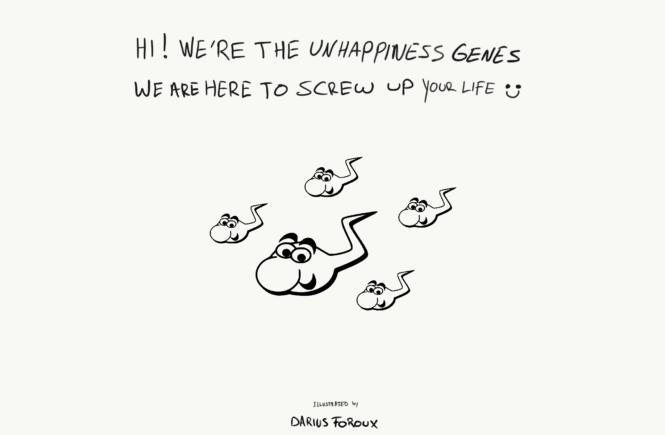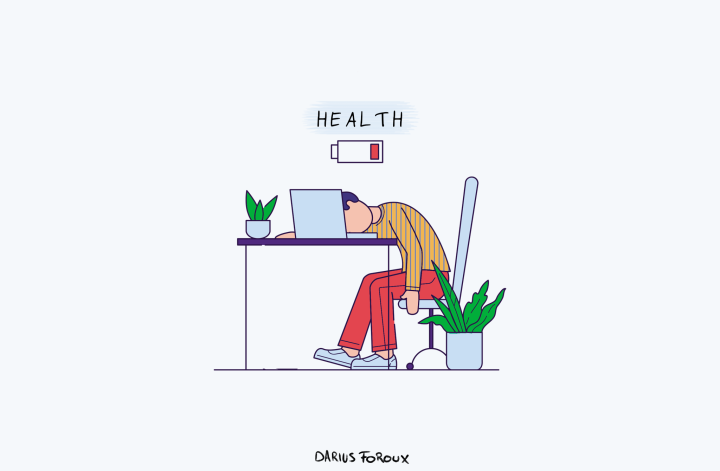Do you sometimes struggle to be happy despite knowing that you live a good life?
I get it, we all chase happiness because it makes a difference in the quality of our lives. I’m no different.
But I also believe we should be careful that we don’t mix up happiness and pleasure. Otherwise, you end up on the Hedonic Treadmill: A state of continually chasing pleasure to elevate your happiness levels.
But the problem is that pleasure only gives us a temporary boost in happiness. Drinking alcohol, smoking nicotine, having sex, buying the latest iPhone—it gives us pleasure. But we always go back to our set level of happiness.
The Hedonic Treadmill Theory Makes You Wonder: Is Happiness Written In Our DNA?
The most remarkable scientific research on happiness in recent years was published last year by professors Meike Bartels and Phillip Koellinger of the Vrije Universiteit Amsterdam.
For the first time in history, in a large-scale international study of over 298,000 people, researchers isolated the parts of the human genome that could explain the differences in how humans experience happiness.
The most important finding of Bartels and Koellinger is that they found three genetic variations for happiness. The outcomes suggest that your happiness is predetermined. Some people are more susceptible to depression. It might depend on your DNA.
Why is this so important?
Until now, we thought that happiness is a direct result of circumstances: The country you live in, your social relations, how much money you earn, how educated you are, etc.
But happiness is more complex than that. In reality, we still don’t know how happiness exactly works. But Bartels and Koellinger’s research opens the door to more research on the impact of genetic on happiness.
Bartels suspects that happiness is determined by a combination of environmental factors and genetics. She says:
“Research has demonstrated that differences in DNA methylation are related to happiness. This means it is not just the genes and not just the environment, but an interaction between these two that is responsible for the feeling of happiness.”
Genetics Matter. But They Are Not The Determining Factor.
Even though you might have a positivity gene, it’s not set in stone you’ll end up happy. The opposite is also true. The good news is that the above research demonstrates you can indeed influence your own happiness.
However, they also show that happiness is very complex: No one single method of ‘happiness-improvement’ works for everyone. People are different genetically.
All of this research is good news: You’re in control. That’s not just a simple self-improvement perspective. That statement is backed by science.
However, you must realize that happiness requires hard work. That’s why people who claim you should ‘stop trying to be happy’ are missing the point. They look at happiness from their own set level of happiness.
For some of us, happiness takes work. But is that a surprise? No. Life is hard in general. And that’s only a good thing for your happiness.
Usefulness Leads To Happiness
A personal breakthrough that I had was when I changed my perspective on happiness. Until a few years ago, I believed that happiness is the only logical pursuit of life. I was wrong. When you actively pursue happiness, you might become happier, but you’re also missing the point.
Why? It’s an inherently egotistical perspective. You’re basically saying that “nothing else matters, except MY happiness.”
But what about the people in your life? Does that mean you should subtly say fuck off to everyone and only think about your own happiness? Maybe that works for you. But I think life entails more than that.
We also know that loneliness doesn’t improve happiness. Real-life sometimes requires you to sacrifice certain things for others. And that doesn’t have to be a bad thing — it’s a matter of perspective.
I believe that the purpose of life is not happiness, but usefulness. Being useful is a mindset. And like with any mindset, it starts with a decision.
Another reader, Melinda, demonstrates that well. She read my article about usefulness recently, and emailed me this:
“You helped my depression SO MUCH with your blog post! I wanted to let you know. I wrote about this in my blog and when I re-read it today, I thought, “I need to let him know how much he saved me from my depression.” I seriously haven’t been this happy in years!
That means a lot to me. But what I’m impressed by the most is Melinda’s own strength. And that she actually took the time to write an article from her perspective. She’s spreading the word. And that’s useful to other people. You see?
(Btw, check out Melinda’s post and show her some love in the comments)
The Truth Is What Works
I’ve said this before: Don’t take it too seriously. Don’t overthink it. Just DO something that’s useful. Anything.
John Dewey, a pragmatist philosopher, and one of the fathers of functional psychology, once said:
“The true is that which works.”
You must find your own truth. What works for you? That’s the only thing that matters in life. And especially for happiness.




